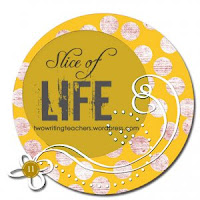Slice of Life Story Day 22 Let's Hear For Ears!
Ralph Fletcher reminded me of the fact that we write with our ears as much as our eyes and minds. I was unconsciously attending to this in my writing and teaching of writing, however Ralph’s articulation of this important fact made me more consciously skilled. When we write with our ears, we become aware of the sound of language, the rhyme and rhythm of language and the impact of words uttered. We are more likely to connect the words that float our way with prior knowledge.
When we purposefully attend to this important fact, we add an extra dimension to our lives as writers. Teachers and students aware of this fact may be more prepared to shift the focus from the what (subject/meaning/ content) to the how (language) in their teaching and writing lives.
Armed with this information I launched into my workshops today with School leaders by playing a song. I asked participants to attend to the lyrics. I directed their attention to those words and phrases that stood out for them. Those word threads that commanded their attention –and demanded to be held in the mind of the listener. I asked them to write down the selected words and to think about any possible connections. Why these words? What was their power? What was their significance to you as a listener?
For the purpose of the exercise, I selected Canadian singer/ songwriter Bruce Cockburn’s song ‘Last Night of the World.’ For me Cockburn’s rich lyrics were perfect for this type of activity. He is a keen observer and his writing possesses a strong poetic thread. – And at the end of the day, I really like the song.
They listened intently, and quietly made notes. At song’s end I invited them to turn and talk about their notations. The room instantly filled with rich conversations. Many made strong connections, often based on a single word. It was a powerful reminder of the power of active and conscious listening. I wished we had been able to explore this more extensively. If time had permitted I could have challenged them to each ‘lift a line’ and use it to generate a piece of writing.
Hopefully, they will now understand the significance of writing with the ear. Many indicated they wanted to share these insights with their teaching staff. I hope this message reaches classrooms.
I explained how I gather so many ideas by eavesdropping, gathering snatches of conversation and listening to the wondrous and infinite combinations of spoken words. The structure of language informs each of us as writers; its patterns, its quirks.
My workshop continued. The point had been made. I remain grateful to Ralph Fletcher for his disclosure about ears…






I find myself revising pieces because the rhythm is not there, the number of syllables of a word. Song is a great way to convey this enigma.
ReplyDeleteI like how you immediately applied the advice, integrating it into your workshop. I use songs in my poetry group, but never have used just 'a' song for pure listening, pulling important parts from it. I will pass this on to my colleagues. Thank you!
ReplyDeleteLove Ralph Fletcher. Lester Laminack and Georgia Heard also use the senses a lot in their work. Sounds like an interesting workshop.
ReplyDeleteHey--great new look to your blog! And I see your book (I assume it's yours) on the sidebar. Double congrats!
ReplyDeleteOkay, back to work. I think one of the challenges is helping students incorporate sensory details into their writing, as well as to be able to glimpse the sensory when they read. The sound of language, the rhythm, the poetics all combine to create a magical place where we reside while reading. Sounds like an excellent day in the classroom. When I have my students talk to each other in teams, I too, love the buzz. Love the energy.
Elizabeth E.
http://peninkpaper.blogspot.com/